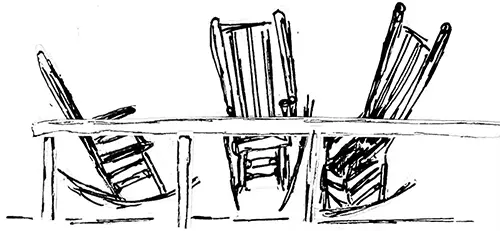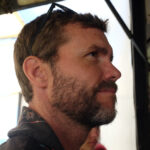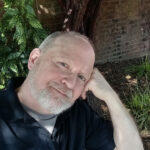The Wittenberg Door 157
The Keeper, The Tiller, The Question
A Cain and Abel Story for Modern Man
A Flat Surface Upon Which to Eat
It’s a new year, and many of us are thinking about self-improvement. This is a wonderful thing to do. We all need a bit of a tune-up now and then.…
Confession
“I don’t roll on nobody,” I said, abysmal grammar and all, but a jail cell is no place for linguistic niceties. My voice was rough, as much scared as aggressive.…
First Hack: A Techno Myth
Unaware, we can stand in a museum, in a temple of modernity that extracts life from all other temples. We can gaze into the vengeful gift of a god while…
Ruddy Glory: The Resonance of Rudolph the Red-Nosed Reindeer
Was May demonstrating, knowingly or not, that even the isolated and disparaged—on the very nose of their ridicule—could be pointing the way brightly ahead through a dark and foggy future?…
Feast of the Solstice of God Among Us: On Healing the Nativity of Fake Light
On this year’s Feast of the Nativity of the Light in Our World in the Age of the Machine, my prayer is this: may our ceremonies not be one dimensional,…
Nostalgia, Longing, and Christmas Joy “In the Bleak Midwinter”
Christina Rossetti's 1872 devotional poem, "A Christmas Carol," has held a special place in my heart from the moment I first heard it at a high school friend’s Christmas concert…
Advent in Oklahoma
Like the people I grew up among, Puddleglum speaks hope sideways, hope being too sacred to speak outright. But he speaks it anyway, sideways and hedged but there, the way…
Narnia Against the Machine: Deep Magic for the Modern Age
Witnessing the ascendancy of the Machine, Lewis understood what was at stake. He watched this ideology sweep across his society and take hold in its schools, and he keenly felt…
Against the Ministry-Industrial Complex, For the Local Membership
Criticizing the ministry-industrial complex does not mean professional resources have no place in ministry. It is not so much their use as their guiding role in congregational life that prevents…
Batter My Heart Three-Person’d God–Break, Blow, Burn, and Make New: Christopher Nolan’s Oppenheimer Re-Members the Poetic as an Opportunity to Consider Redemption
Oppenheimer replies to him “Why I chose the name is not clear, but I know what thoughts were in my mind. There is a poem of John Donne, written just…
Perseverance and Grace: Or, Why I Don’t Deserve a Damn Bit of Credit for my Life
I’ve found that in perplexing or challenging circumstances, “why?” is a boring question. We like why. The leadership guru Simon Sinek asks us to start with why. It’s a popular…
A Saintly Character Seen Through a Glass Darkly: A Review of Walking with Father Vincent
Mr. McNabb recognizes the central passion of Fr. Vincent: his deep love for Christ, expressed through a severe asceticism, a total devotion to traditional Catholic doctrine and social teaching, a…
Christians and the Classics
“Truth, wherever it is found, belongs to God.” This is true, then, when dealing with ancient writings of cultural value and significance. The truth and beauty found therein belong to…
Blessings to Impart
What’s stopping you from blessing your yard, neighbors, and neighborhood, your watershed, the land you drive over everyday? Bless the world, literally, and with your being. Offer it up to…
A Community of Aliens
I continued to stumble on, frequently forgetting my own story, seeking evermore opportunities for dislocated, immortal, heroic freedom from the chains of that finite, particular history. It was only a…
Augustine, Vodolazkin, and Christian Visions of Past and Future
Vodolazkin’s critical vision of the Medieval Russian past is no different in essence from Augustine’s similarly sharp and un-glamorous vision of Roman history.
Deeper than Religion, with Powys and Chesterton
Instead of opposing one religion to another, we need the conscience and that humorous raised eyebrow, which Powys described, with feminine overtones, as “that withdrawn, quizzical look which conscience, that…
The Poor You Have Always With You
Accompanying the poor or inhabiting their number, the honest among us recognize our own fundamental impoverishment. Bernanos, a father and husband who long depended on others for sustenance, inhabited the…
Combatting the Christmas-Industrial-Complex
One can have a very merry Christmas with great simplicity. And maybe, thinking of charity toward our less fortunate neighbors, modeling simplicity has its virtues.
A is for Alligator
But the promise of the coming of the Messiah is that all these animals will be changed from enemies of the human race into its friends, or at least comfortable…
No Justice, No Peace? René Girard and Endless Rivalries
The rivalry we’re experiencing goes deeper than symptoms, political principles, and even the need for responsive, wise leaders. Indeed, it may bypass principles and wisdom altogether. But to explain it,…
Losing Elections and Telling Better Stories
As we enter this season of Advent, we would do well to share the skepticism of Mary and her misfit Son about the powers of this age to establish an…
The Insistent Cough of Grace: Remembering Frederick Buechner
His books are not a diminishment of historic and intellectual Christianity. They are a translation of Aquinas, Barth, Calvin, and the rest into the language we all speak innately but…












